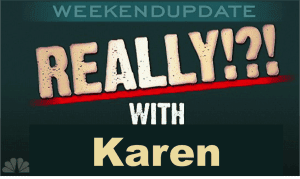
Karen Wolk Feinstein, president and CEO of the Pittsburgh Regional Health Initiative, channeled the Saturday Night Live Weekend Update segment “Really!?!” in this recent op-ed titled:
“Don't put this on patients: Sick people are supposed to monitor medical errors? Really??“
I'm all for patient engagement, and I certainly believe that patients should be aware of risks and dangers in the hospital, but I think the hospital is abdicating its responsibility, and it's setting unrealistic expectations if they are expecting patients to report (or even know about) medical errors or unsafe practices.
Karen writes:
Why is it voluntary in most settings for doctors to mark a surgical site before cutting, for staff to wash their hands, for hospital and examining rooms to be thoroughly cleaned, for safety checklists to be employed? Why do whistleblowers get marginalized? Why are interns and residents afraid to report mistakes they witness? Why are clinicians who often over-treat with unnecessary interventions and tests or who routinely under-treat and fail to perform evidence-based best practices allowed to continue doing these things? What if a patient isn't even aware that medical mistakes are occurring? How could they tattle on their docs?
“Really??”
She draws parallels to restaurants, asking why a person would eat at a restaurant that gives them a 25% chance of getting food poisoning. Do we rely on restaurant customers to report unsafe conditions in the kitchen or refrigerators?
I've made a parallel argument before, pointing out that airline passengers aren't expected to double-check the work of the pilots. When you buy a new car, you aren't expected to double-check if the lugnuts on the wheels are tightened properly.
My graphic below is indicative of campaigns that encourage patients to ask doctors and nurses if they've washed their hands:

See more at AskMeIf.com.
I think the primary responsibility needs to be taken by hospital leaders and physicians… not the patients. Let the patients focus on their own health, recovery, and comfort, not policing the system that is supposed to take care of them.
Please scroll down (or click) to post a comment. Connect with me on LinkedIn.
Let’s work together to build a culture of continuous improvement and psychological safety. If you're a leader looking to create lasting change—not just projects—I help organizations:
- Engage people at all levels in sustainable improvement
- Shift from fear of mistakes to learning from them
- Apply Lean thinking in practical, people-centered ways
Interested in coaching or a keynote talk? Let’s start a conversation.









![When Was the Last Time a Leader Around You Admitted They Were Wrong? [Poll]](https://www.leanblog.org/wp-content/uploads/2025/07/Lean-Blog-Post-Cover-Image-2025-07-01T212509.843-100x75.jpg)
Unfortunately, after many years of car ownership, I now check everything (that I can see and reach) that the mechanics touch while doing a job. I’ve had panels improperly installed, clips left off of replacement axles, dipsticks not pushed all the way in, among other things…
You’re much more knowledgable than the average car owner, then!
Agree entirely Mark. The average patient doesn’t have the depth of knowledge to be able to detect a medical error. In addition to that, standards for medical practices aren’t visible. Without job conent knowledge or visible standards, it’s virtually impossible for people to be able to do anything but report the grossest and most obvious medical errors.
Sounds like defection rather than really trying to work to improve the system.
Great article. I agree with all that the average patient doesn’t know when an unsafe condition is created, so it’s ridiculous to suggest they should be responsible for their own safety. There are a few things (asking questions, waiting for the nurse to avoid a fall, etc.), but for the most part, the hospital and the providers need to ba accountable.
Hi Mark
You got this one right, yes if we know a medical professional is doing something wrong we should naturally complain and point it out. But there are very few of us that have enough knowledge of medical practises to be able to tell if they are doing most of their job right or not. It falls upon those in any profession to protect their clients by treating them in a proper way and by policing their own members.
It is unfortunate that we have developed a society were bending the rules is common place and in fact is required because of dumb laws. Yet it makes it hard to get anyone to enforce rules in virtually any organization. Hence why people that blow whistles usually pay a price for it, which they shouldn’t, in fact they should be rewarded.
[…] For years, I’ve gently mocked the “ask me if I’ve washed my hands” buttons that some staff are asked (or forced) to wear. I’ve pointed out that no other industry puts this quality inspection burden on their customers. […]